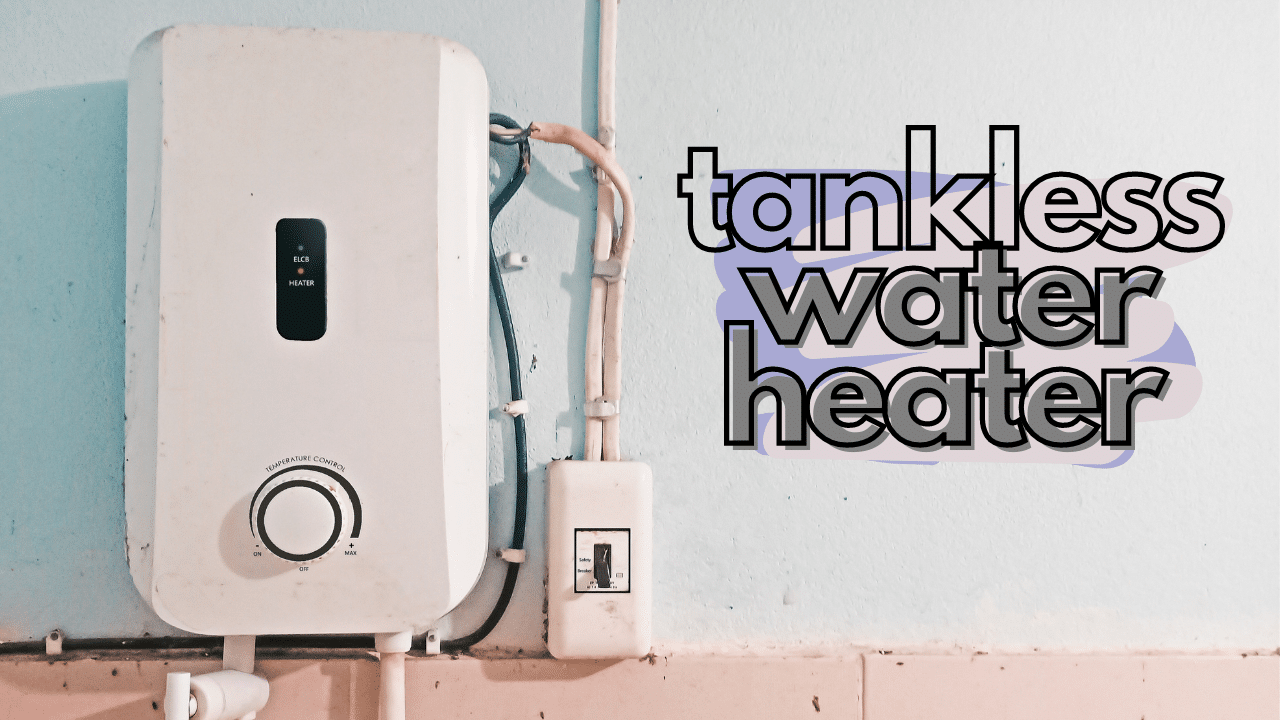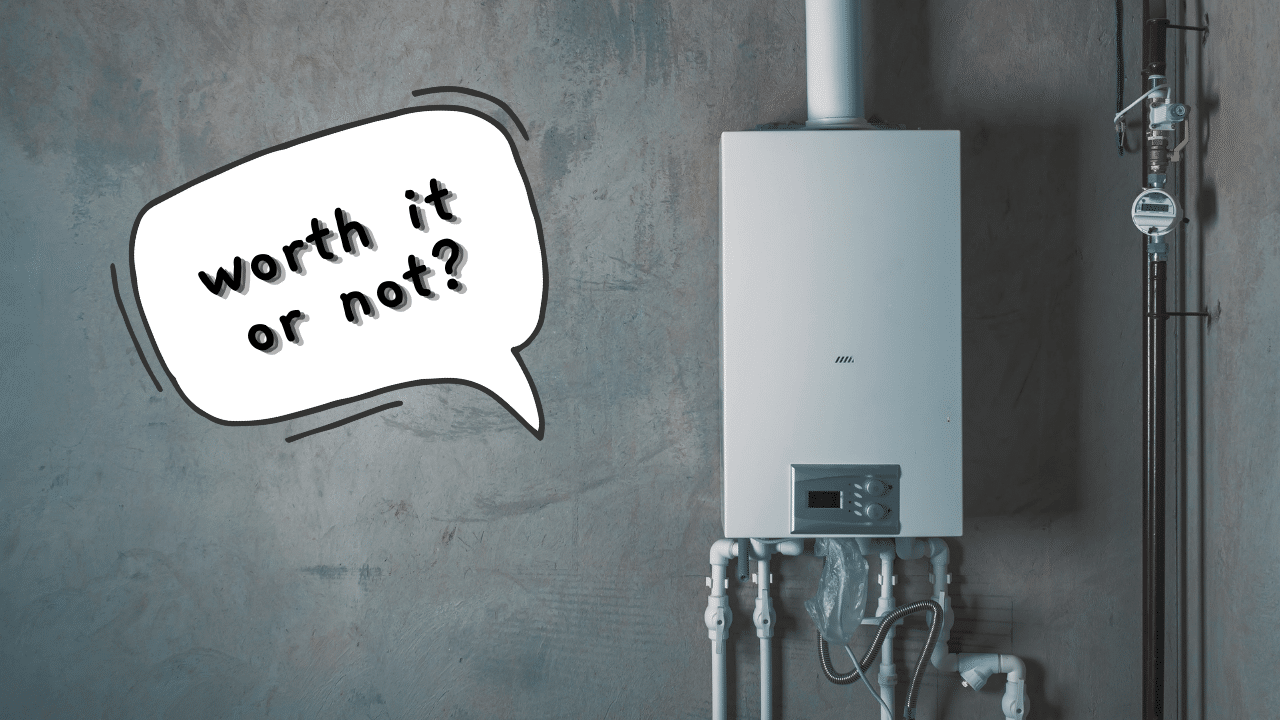Tankless water heaters, AKA instant or on-demand or water heaters, continue to soar in popularity among homeowners nowadays.
It presents several advantages over traditional tank-style water heaters, which makes it a good new long-term investment to consider. For one, the operation of tankless water heaters present substantial energy efficiency and cost savings in the long run.
Unlike the standard tank-style units, which always heat and reheat water, tankless water heaters offer instant warm water through high-powered gas burners and electric coils. It does require more power for the most part, but since it doesn’t need to reheat the water as often, you end up using less energy overall.
The US Department of Energy claims that tankless water heaters are up to 8 to 50% more efficient than their tank-style counterparts– with the total efficiency rate dependent on the amount of hot water you use daily.
If you’re wondering how much it costs to install a tankless water heater at home– the expenses start at $920 to $4,025 on average.
However, like any other product– tankless water heaters have their pros and cons to consider. Let’s discuss the downside of a tankless water heater to decide if this relatively new water system is the right choice for your home needs.
Tankless Water Heater Cost Overview
Installing a tankless water heater at home starts from $920 to $4,025. Units that run on a gas or electric on-demand system are priced at $345 to $2,415 for the labor costs.
In a year, tankless water heaters help you save an average of $47 to $230 by reducing your usual energy costs by up to 8% to 34%.
In contrast, gas-powered tankless water heaters will cost you more at $800 to $5,300. If you have an existing residential tank water heater and want to switch to a tankless unit, this will cost you around $920 to $4,025.
The total expenses will depend on your chosen brand, flow rate, and the unit’s fuel source. Refer to the table below for a quick rundown of the different fuel types of water heaters and their average installation costs. (Related: Are High-Efficiency Water Heaters Worth It? A Cost & Savings Analysis)
| Average Installation Costs |
|---|
| |
| |
| |
Tankless Water Heater Key Insights:
It lasts up to 5 to 10 years longer than traditional tank-style units
It comes with 5 to 15 years of covered warranty
It helps you save $47 to $230 on annual energy bills
Eligible for $345 federal tax credit and other rebates (natural gas and propane units)
New installation takes 3 to 10 hours, while a replacement lasts for 2 to 4 hours
What is a Tankless Water Heater?
To fully understand how a tankless water heater system works, you need to grasp how a standard water heater function.
A standard tank-style water heater uses a large tank to store and heat the water accordingly. It continuously heats the water to maintain the warm temperature around the clock– giving you hot water when you need it.
Even if you’re not using hot water, the system continues to use (and lose) energy. In contrast, tankless water systems lack the typical large storage tank. But it is notably more energy-efficient as heating water will only be done on an “on-demand” basis using high-powered burners through a heat exchanger.
What are the Advantages and Disadvantages of a Tankless Water Heater?
It is ideal to fully understand the pros and cons of installing a tankless water system at home to make an informed decision.
Pros of Tankless Water Systems
The most significant selling point of tankless water systems is their energy efficiency. These units use less energy than standard tank-style systems to cut billing costs by up to 40%.
In a year, this may add up to $115 in savings on average. Additionally, tankless water heaters are known for their longevity– lasting for around two decades.
Provides Hot Water Any Time of the Day: Need hot water at 2 AM? 3 PM? A tankless water heater can give you hot water almost instantly. You can count on these units to provide your heating needs without the hassle of bulky tank-style storage.
Lower Monthly Running Costs: Although tankless water heaters have higher upfront costs, they are more cost-effective for recurring expenses. The monthly savings may not be too grand, but homeowners can expect to save more than $115 in a year. That can amount to a substantial total in the long run.
Guaranteed Longevity: Homeowners can benefit from the longer lifespan of tankless water heater systems, up to 20 years. It is a stark contrast to the lifespan of tank-style systems at only around a decade. Tankless systems save you the need for a replacement after ten years.
Space-Saving Design: If you have a small home, the space-saving features of a tankless water heater can be a great benefit. These units are smaller and less bulky. Usually, they are only mounted on a wall in the basement.
Eliminate “Standby Loss”: Traditional tank-style heaters are infamous for “standby loss.” These units repeatedly reheat water, even when you don’t need it or there’s no one at home. Hence, it raises your monthly energy costs. Fortunately, tankless heaters eliminate this loss.
Consistent Supply of Hot Water: Since tankless water heaters operate on an “on-demand” system, you can expect 2 to 3 gallons of warm water in a minute. It doesn’t rely on your reserved water to meet the demand. It can be beneficial for households that use quite a lot of hot water frequently.
Available Electric and Gas Models: Commonly, tankless heaters are powered by natural gas. These days, however, electric models are becoming another crowd-favorite option. Consult your contractor if opting for an electric model may eliminate the need to reroute the existing gas lines or spend more on costly alterations.
Financing and Tax Breaks: Tankless water heaters may qualify for federal tax credits (10%) due to their energy efficiency. It can help many homeowners who find the high initial installation fees a bit out of budget.
Cons of Tankless Water Systems
So, what is the downside of a tankless water heater? Although these units are known for their longevity and energy-saving features– these heaters have higher upfront costs.
The unit itself will cost you somewhere around $920 to $1,150, while their tank-style counterparts only cost $450 to $750.
That said, expect the installation cost to be more expensive as well.
Inconsistent Water Temperature: An excellent method to determine the downside of a tankless water heater is to browse through the most common customer complaints. One of these includes an inconsistent water temperature. Note that this problem is usually brought about by the tankless heater’s inability to deliver sufficient heated water to multiple outlets at a given time.
Higher Upfront Costs: With double the average lifespan of traditional units– it’s pretty expected for tankless heaters to cost you more. The cheapest tankless option begins at $1,150.It’s best to prepare for more expensive installation fees since specialized heaters are trickier to install.
Unable to Supply Hot Water Simultaneously: It’s one advantage to have a steady supply of hot water. However, keeping up with simultaneous outlet demands is another thing. Let’s say someone is using the home washing machine while another person takes a shower– a tankless water heater may fall short of keeping up.
Additional Equipment may be Required: In most cases, you will need to install a water softener for the smooth operation of your tankless heater. It costs anywhere from $575 to $6,900. Residential water softener units are designed to eliminate or neutralize any heavy minerals in the hard water. Keep in mind that this additional equipment may also consume more space, effectively negating a tankless heater’s space-saving features. The bulky softener and the salt bags will take space beside your mounted heater.
Re-routed Gas Lines: Since tankless heaters follow a non-standard system setup– this may only hike the installation costs accordingly. Depending on your home needs, your contractor may need to re-route an existing gas line or install new venting.
ROI May Take Up to 12 Years: Simply put, it may take a few years for the high initial costs of a tankless heater to pay off technically. You may be looking at a 6 to 12 years (or more) waiting period for the monthly recurring costs to add to the total upfront costs.
Solar Water Heating is Available: Homeowners looking for green energy options may opt for a solar water heater system instead for their hot water needs. This unit includes solar collectors and storage tanks. Additionally, solar-powered heaters may save you from rerouting the existing gas lines or installing new fixtures, unlike installing tankless units.
Conclusion
Tankless water heaters are a great choice if you’re tired of running short of hot water when you need it. Also, no more having to wait more than 20 minutes for warm shower water!
Not to mention, these units are compact, highly efficient, and space-saving.
If you’re planning to replace your old, tank-style water heaters or you need to install a new water heating system at home, talk to a professional plumber or technician to know if a tankless water heater fits your home needs.


